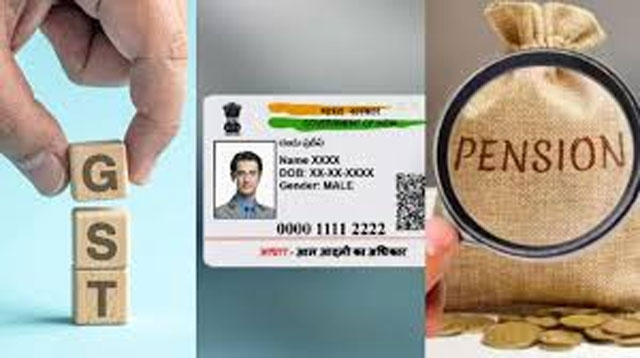Daijiworld Media Network – New Delhi
New Delhi, Nov 2: Starting November 1, several crucial changes in India’s financial and banking systems have come into effect, directly impacting millions of citizens. New rules covering bank nominations, GST slabs, pension procedures and credit card charges are now in force, marking one of the most significant regulatory overhauls in recent years.
In the banking sector, customers can now nominate up to four individuals for their bank accounts, lockers or safe custody deposits. The rule, effective from November 1, is aimed at simplifying fund access for family members during emergencies and preventing ownership disputes. Banks have also streamlined the process of adding or changing nominees, making it quicker and more convenient.

The Goods and Services Tax (GST) structure has undergone a major revision. The government has replaced the previous four-tier system of 5%, 12%, 18% and 28% with a simplified two-slab model, which has now come into force. The 12% and 28% slabs have been abolished, while luxury and sin goods such as tobacco and cigarettes will now attract a 40% tax rate. Officials said the move is designed to make the tax framework simpler, more transparent and easier for businesses to comply with.
Significant updates have also been introduced in the pension system. Central government employees wishing to switch from the National Pension System (NPS) to the Unified Pension Scheme have been given time until November 30 to make their choice. The extension, according to government sources, offers employees greater flexibility to decide. Pensioners are also required to submit their Life Certificate by the end of November—either at their bank branch or online via the Jeevan Pramaan portal. Officials have warned that failure to submit the certificate could delay pension disbursements.
The Punjab National Bank (PNB) has announced plans to revise its locker rental charges, with the new rates depending on locker size and category. An official notification is expected later this month, and the revised charges will come into effect within 30 days of the announcement.
For State Bank of India (SBI) credit card users, new transaction fee rules are also in place. From November 1, a 1% fee is being charged on education-related payments made through third-party apps such as MobiKwik and CRED. Similarly, loading more than Rs 1,000 into a digital wallet using an SBI credit card will incur the same 1% fee.
These sweeping regulatory changes are expected to reshape daily financial habits, influencing how people spend, save and manage their money. Financial experts have advised citizens to remain alert, noting that 'being aware of the new rules will help avoid unnecessary charges and disruptions'.
With reforms spanning banking, taxation, pensions and payments, November ushers in a new financial landscape that will affect nearly every Indian household.